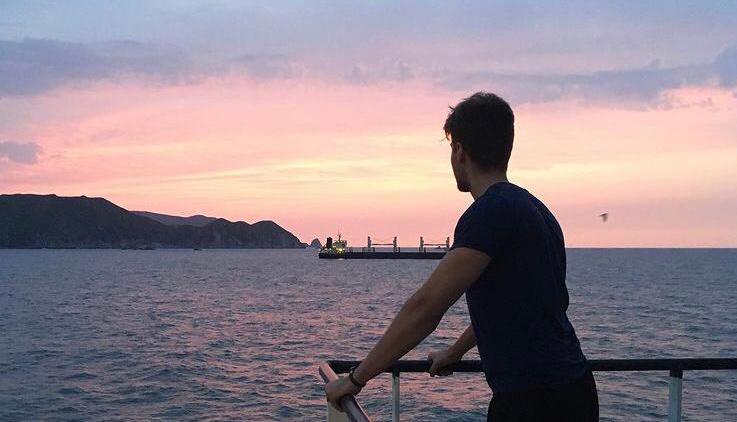
8 minute read
THE YOUNG SEAMAN'S LIFE
from MAEM MAGAZINE 9
by MAEM
‘Thank you, Great Water, for making me a crew…’
With a quote from Jurek Porębski's sailor song we welcome Michael Macierzynski, a graduate of Gdynia Maritime School, who has been an active engineer for half a year and describes his work and career path on YouTube channel Young Sailor Vlog.
Michael agreed to give us an insight into the path a young adept must take to one day sign his first contract and set sail as a crewman.
A doctor, a singer, a firefighter, a policeman and a teacher are the five most popular professions that children aged three to six dream about, according to a 2016 IPSOS survey. What was it like for you? Since when did you know you would become a sailor?
This was in my second class of high school so it was a mature and thoughtful decision. I've been into mechanics and DIY since I was 7 years old and in high school I spent a lot of my free time fixing my car. Then, I wondered more and more whether I should become a mechanic. At that moment something woke up in me, I was inspired by my brother-in-law, who was then a third officer mechanic on chemical tankers and I decided that I would follow his path. My brother-in-law, Cezary, directed me on what school to choose, how to get started, what to focus on the most, etc. and at this point I'm a fourth-year mechanical officer and he's a second-year.
How did your family react to your plans when they realized you were going to get serious about it? Among the jobs that a young boy can do, there are, let's say, ‘quieter’ professions than sailor.
Honestly, my family was a little shocked that I chose this path because everyone
knows that working at sea is associated with many sacrifices and is not the safest.
However, after some time everyone accepted it calmly and said that I was following in the footsteps of my grandparents because my great-grandfather and my grandfather who served in the Polish Navy, both were connected to the sea.
Okay. Everyone already knows that Michael is going to be a sailor. What next? Are you waiting calmly for your university exams or can you start preparations before them to make your future path easier?
The moment I knew I was going to apply for a maritime school I started to put more emphasis on learning English because, as we all know, English is the main language at sea. Nineteen-year-old Michael, during the inauguration of the academic year, receives an index of the Maritime University. This is a milestone on his way to a career but still does not guarantee success...
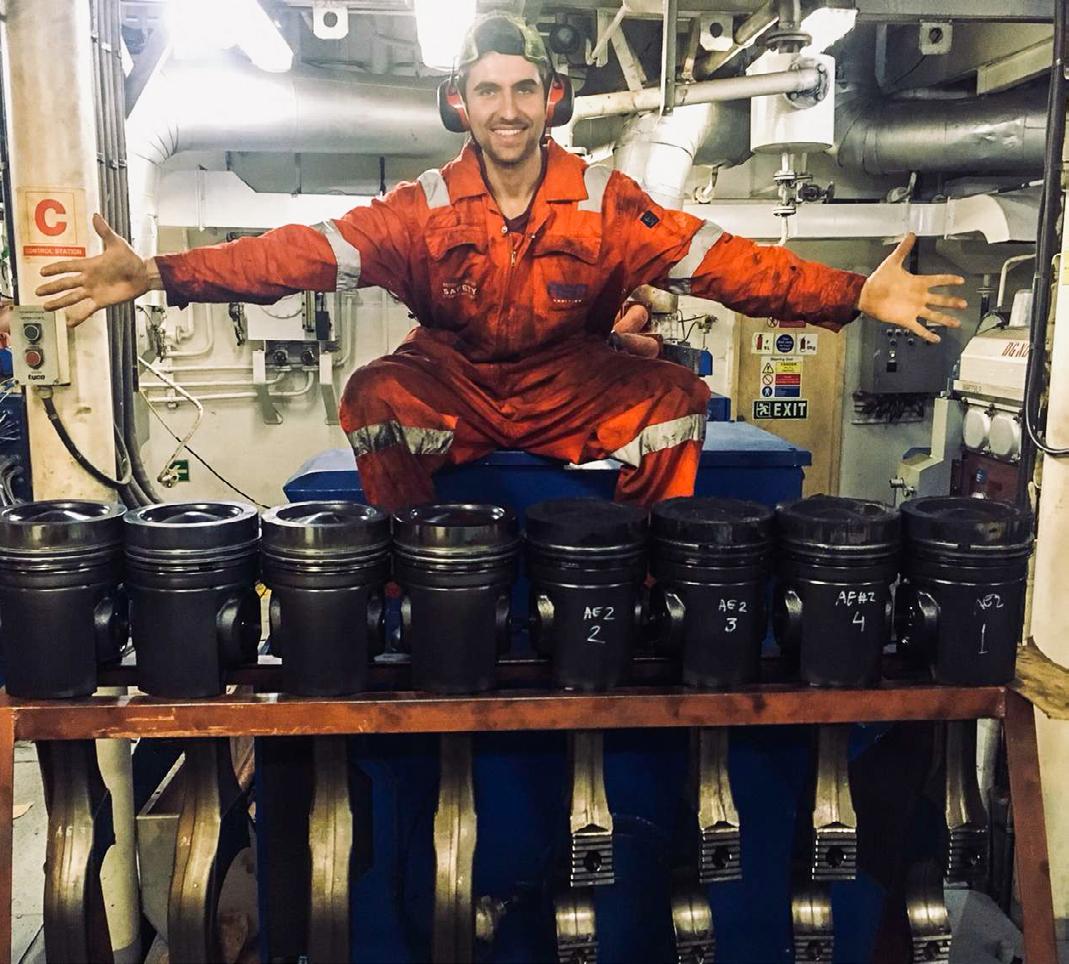
The moment I got the diploma of the Maritime School I knew it was a big step towards my professional career, I had a strictly defined goal and I persistently pursued it. However, not everyone succeeded - we started the first year in a group of sixteen - by the fifth semester there were probably only seven people left from that group. A lot of people quickly decided that working at sea, many months away from home, wasn't for them and they just handed in their transcripts.
One of the best known authorities in the Polish maritime industry community (our regards to Mr Ireneusz) once said that the sea nourishes and provides work for the whole country, not only for coastal residents. The MAEM company, located about 500 km from the nearest Baltic Sea, is an excellent example of this. Are there many students from inland in the university corridors and later among the crews?
Studying maritime studies is certainly closer to people living on the coast, but that doesn't mean that there aren't students from other parts of the country at universities of this type. In my group I had friends from Tricity but also from Warsaw and the area around Czestochowa. I met some Poles on the ships and for example the captain was from Wejherowo, just a few kilometers from where I lived, but I also met a cadet on deck who lived in Lublin.
What was your first voyage as a crew member? Probably as a cadet during
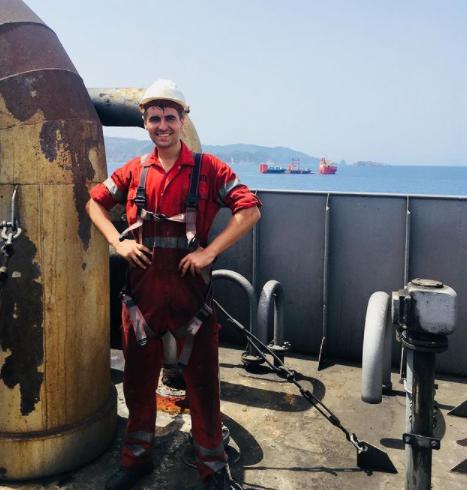
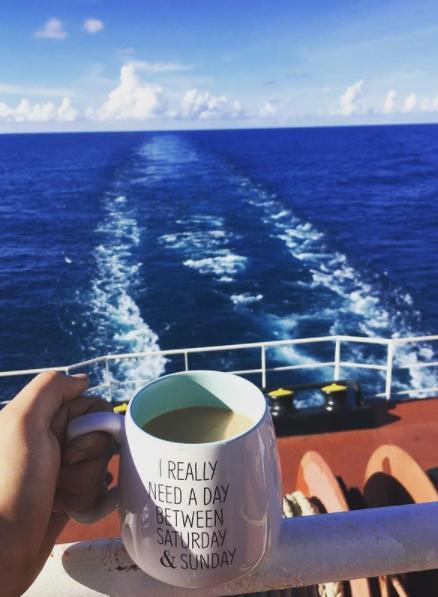
a student internship... Can you tell us more about it?
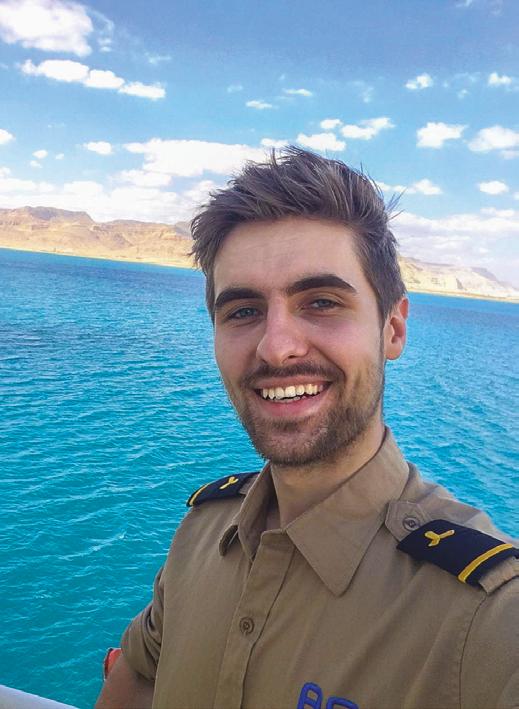
Oh, that first cruise when I was already a cadet... Great experience, adrenaline, fear, longing - despite such emotions I remember this contract very well. I visited beautiful places in Europe, I ate great hamburgers in the U.S., drinking coffee from Starbucks, in Mexican ports I met many wonderful people with whom I partied until the morning. I admired the sunset from the best restaurants in Coatzocoalcos. I explored a bit of Africa and sailed through the Suez Canal. I made wonderful friendships on that first ship. The officers and ratings treated me very well, they were polite and friendly because they knew that the first time on a ship is not easy.
On my first contract I experienced huge storms in the Atlantic. I learned a lot because I had very good officers in the engine room who tried to make me better every day.
You're graduating from your dream college. What does the job market look like? Is it hard for a young graduate to find a good job these days?
When I graduated from Maritime School and I had already passed my exams at the Maritime Office and had
all the documents and diploma of an officer I did not have to wait long to embark on a ship as an engineer of the watch. From the moment I signed my first contract as a cadet with a Dutch shipowner, I had a certain position in the company and basically a certain promotion from cadet to officer. There are very few engineer officers these days so the job market for engine crew is very favorable.
Your career at sea has recently begun. Have you ever had moments of doubt when you wished you were spending eight hours in an office ashore? What are some of the things that bother young (and not only) seafarers?
I'm sure there have been moments of breakdown, especially when you've been away for six months and aren't sure if you'll be able to return anytime soon. However, after such moments, the sun always comes out and everything returns to normal. Sailors definitely get nostalgic. We miss our girlfriends, families and friends. We often miss the simplest things that we always have at home. It is not uncommon for us to work twelve to sixteen hours a day, get little sleep, and miss our bed and normal sleep.
What does your workday look like? What are your main responsibilities on the ship?
It's hard to describe what my normal day looks like because things are constantly changing. Sometimes I work eight hours, sometimes fourteen. Every day I have routine duties, which means I make rounds in the engine room, check the condition of the equipment and machines. When everything is in order, I start my standard work. These include the production of steam in the ship's boilers, I am also responsible for fresh water production, the sewage treatment plant, the proper treatment of fuels using centrifuges and the management of oily water and used oil. I have to control the quality of cooling water for engines and other machinery. The ship's incinerator, bilge water separator, centrifuges, boilers, and pump evaporator are all pinned to my position as fourth engineer officer.
The life of a sailor is not just a job - there are many legends about it. Free time and visiting the most beautiful corners of the world, freedom, harbour taverns? How do seafarers spend their free time during their contracts? Let's assume that there is no pandemic and the restrictions associated with it.
The life of a sailor is really great. You get the opportunity to explore the whole world. I experienced it myself. In our free time we went out on the town, to the beaches, to beautiful restaurants for discos. We went on all kinds of trips, for example to the NASA center in Houston. I loved that sailor life!
Michael, we are delighted that you have agreed to start cooperation with MAEM as its ambassador. We will be very glad to welcome you to our factory and, thanks to our camera, to take a peek into your professional life from time to time.
While working on ships, I have encountered alternative replacement parts for many pieces of equipment. They are not a bad thing. However, depending on the supplier, there are products of varying quality. Low-quality, arguably cheaper, parts can be quite problematic to install and tend to wear out quickly. These products provide illusory savings for the shipowner, but significantly increase the amount of work necessary for mechanics to maintain proper operation of the equipment entrusted to them. When I am sure that a manufacturer of alternative parts does not compromise on quality, I can rest assured as their user. I decided to trust the MAEM brand because I see that it deserves it.

Thank you for your kind words and trust and for the interview, as well. We will be meeting Michael on other MAEM marketing channels. In the meantime, we invite you to follow Michael at:
Youtube: youngsailorvlog
Instagram: xmiczix
Facebook: Michal Macierzynski










